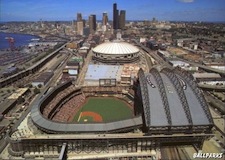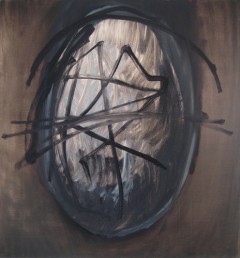Editorials Shaun Scott — October 7, 2013 11:49 — 0 Comments
The Monarch Drinks With Safeco
Desperate for shelter and disheveled by a cruel battery of autumn winds, the truth about baseball in Seattle was never clearer to me than when I was on my way to Safeco Field on the last Saturday of September 2013 – it’s a struggle. On the field, you know who the Seattle Mariners are? They’re a chronic complainer of a friend who, deep down, you know you hang out with because you pity them.
Fearing that you may take on their disposition by osmosis, you make the decision to minimize the risk to your own well-being. You see them only for birthdays—or better yet slightly before or after—and occasional dinner dates with time constraints enforced more strictly than those in a maximum security prison. The semi-monthly “I’m so glad we’re friends†text you get from them at 3:00AM is the equivalent of the “Thank You Mariners Fans†sign hanging near the left-field foul poll. You die a little inside every time you read it. I’m not saying this is right—I’m saying it happens, and that this is what it’s like, emotionally, following a losing team.
For anyone with even minimal emotional investment in a baseball game—and it’s pretty hard to make it through anything that lasts 3 hours without being emotionally invested—the statistic “batting average with runners in scoring position (BA/RISP)†may as well be called the “Heartbreak Indexâ€. Quantitatively, BA/RISP measures your team’s proficiency at capitalizing on a chance to score. But qualitatively and emotionally, it conveys their level of skill at making positive use of good fortune and rewarding your optimism with achievement. It’s the baseball equivalent of “frequency with which your romantic partner does what they lead you to believe they’ll do.†And everyone knows the importance of keeping that stat!
Of course, BA/RISP can be measured in a single game, but it’s usually expressed as a cumulative statistic for both players or teams across a season. And the lower the number is the more often the team or player doesn’t score runs when they have a chance to; an aggregate BA/RISP in the paltry .000-.225 range, and your team makes you hate that you love them. On July 4th—about the time I stopped watching the Mariners’ rendition of “America’s past-time†2-3 times a week because I was sick of their performance in exactly this aspect of the game—the team ranked 29th of 30 teams in BA/RISP. Meaning, for at least half of this season, the Seattle Mariners were statistically the 2nd best team in the league at wasting opportunities and letting down their supporters.
That, in a nutshell, has been the state of affairs with the Mariners for the last 12 years. With its seasonal rites like Opening Day, the All-Star Game, and the World Series, and players who compete with one another statistically across generations, baseball is a remarkable framing device for the passage of time. On October 22nd, 2001, the day the Mariners played their last playoff game, the following sentences were written by a reader named David in the ‘Letters To The Editor’ section of The Nation:
No sane person would condone the terrible acts in New York, Washington and Pennsylvania. But what’s missing from our reaction is self-reflection and self-criticism. America has drawn increasingly inward with George W. Bush and his isolationist policies.
So the Mariners have been historically bad. Look, the average career of a single baseball player lasts 5 years: teams that can’t make it to the playoffs with more or less the same regularity that states decide whether or not to switch senators fail on the field, but in a deeper sense they fail because of the players team management puts on the field. So I arrived at Safeco Field on the last Saturday of September 2013, soaked by a typical Seattle squall, and self-assured that no amount of alcohol on this day could make me behave as short-sighted, incoherent, or irresponsible as Mariner ownership has since even before the time this happened.
Safeco Field opened on July 15th, 1999, and it still seems surprisingly new. The retractable roof, which takes about 25 minutes to open or close completely, sits atop an airy web of steel. Like all stadiums, it’s cavernous and difficult to navigate. But unlike all stadiums—particularly the monstrous Kingdome, which it replaced—you can walk around and still feel like you’re essentially outside. Because you are: the damp, weighty air that wafts in from nearby Puget Sound routinely keeps fly balls that would be homeruns in any other stadium inside “The Safe’s†confines, and it’s as crisp and clean as the Stella Artois I hoped waited for me in the luxury suite that The Monarch’s Managing Editor, Jake Uitti, talked up a few days earlier.
It’s a little chilly everywhere you go in Safeco Field, but the collective warmth and energy of being around that many people makes up for it. All of us prepare psychological defenses for social outings that may end with us being alone—a movie where your friend might not make it, for example. But I found that mine were failing me in the moments before The Monarch’s Jake and Caleb showed up in the lobby (with the tickets). It was raining hard—even for Seattle—and, goddammit, I needed to vent to someone about the inanity of professional sport and its ability to make us brave these kinds of conditions.
I’ve waited in the wings to write a “bread and circusesâ€-style takedown about this team and thought this would be my chance. But here’s the thing: they didn’t serve bread in the luxury suite where we watched the game! They served prime rib, mashed potatoes, fried chicken fingers, soft-serve ice cream, and an impressive array of vegetarian options I can’t pronounce correctly. I started the day planning to pepper Jake and Caleb with difficult questions about how it is that we go about enjoying American sport despite full knowledge of its more insidious aspects, but I went ahead and peppered my steak instead.
The A’s had runners at the corners, and my biggest concern was what my first drink of the day would be, since they didn’t have Stella. When me, Jake, and Caleb regrouped and sat near each other, along with Jake’s girlfriend Rachel (who got us the suite tickets and joined us in the 4th inning), I found myself actually getting annoyed when cheers from a Brad Miller grand slam interrupted a conversation where we were comparing the misogynistic tendencies of Charles Bukowski and Kanye West. The game was an afterthought. The conversation was at the fore. I was in love with the atmosphere.
Luxury suites at Safeco Field are a dozen stories above the field, and encased by double-paned plastic windows. Televisions inviting you to divert your attentions are everywhere: on one of them, a local sportscaster was applying her make-up, not knowing she was on the air, and it made me think—why the fuck are there TVs broadcasting the game at the game? I was too happy to sustain criticism of anything, though. The drinks kept coming, brought to us by conventionally attractive waitresses who were all kinds of fun to look at. “I’ll have another.â€
I know this sentence seems like it doesn’t make sense, but I’m pretty sure it does: Sports aren’t real, but their effects are, and that’s what makes them real. Because sports franchises lead double lives: an altogether simulated one on the field of play and a very real one off of it. And at the heart of the socially-conscious fan’s experience is this: whether they lose or win 90 games a year, entities like the Mariners are the epicenter of revenue streams which rival the GDPs of the developing nations from where many of the players on professional baseball teams are culled. If one can fail as convincingly as the Mariners and still provide such impeccable entertainment, it forces you to recalibrate what exactly failure and success mean in professional sport.
I mean, let’s take that average 5-year baseball career of a player from one of those developing nations. A team like the Mariners takes a chance on him that he could only get in cities like ours, because the other teams are trying to win. He’s an impatient hitter, his fielding is shaky, and he runs the bases with less focus than a 7-year old playing tag after drinking a 48oz. Slurpee and eating a solid pound of cotton candy.
On the other hand, he hits for just enough power and average (.245, 19HR, 55RBI) to get a 3-year, multimillion dollar deal. In situational baseball—when to hit the cut-off man, how to slide to break-up a double play, etc—he’s a cretin. He’s also a member of the 1%, and he’s smart with his money. He sends enough of it back to El Salvador—a country where 1/6th of the national wealth comes from remittances—to bring his family out of poverty. By swinging a bat with average professional proficiency, he personally reverses his family line’s generational dynamic of poverty and violence that’s been brewing since, I dunno, the day the most notorious mariner in history, Christopher Columbus, set sail.
But until he learns to take a pitch, my privileged, buzzed, pseudo-sportswriter American ass will kill this guy every time he makes a mistake—I mean, just murder him with words whenever he grounds out limply to 3rd on the first pitch of an at-bat. I’ll “wish we were more like the Yankees†and say that this guy’s performance is the reason we’re not. By going to the games and buying the merchandise and watching the team on TV, myopic and self-righteous fans like me pay-out this guy’s contract, which the team will renew after 3 years, because of course the Mariners re-signed a guy who has a Heartbreak Index of .115!! I’ll have another beer and insensitively compare my team’s flawed ownership to the Bush Administration handling of the global situation after September 11th, 2001.
But to everyone lucky enough to be even a distant cousin of this player, he’s an effing saint, and the most viable option to enjoy the standard of living which, at this very moment, allows me the time, resources, and social capital to express my opinions about a game on the internet. So, in Safeco Field, drinking and eating with friends in the luxury suite on this day, the second-to-last-game of the (very losing Mariner) season, the prime rib was delectable, the conversation was lucid, the laughs were hearty, and the beer was cold. And everything would’ve been just as good or bad as it is now if the Mariners won or lost that game. Though I’m pretty sure they won that afternoon.
The answer isn't poetry, but rather language
- Richard Kenney




